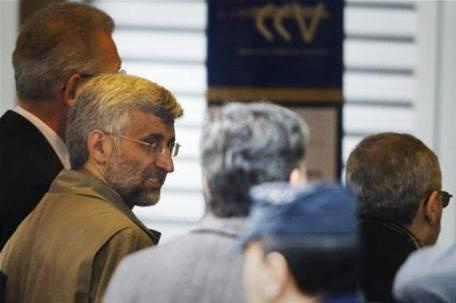A Decade of Nuclear Challenge

(Photo: Secretary of National Security Council and Iran's chief nuclear negotiator Saeed Jalili arrives at Swiss airport to start nuclear talks with six global powers in December 2010. Source: Reuters)
By: Mahdi Mohammadi
Nearly ten years have passed since the beginning of the challenge dubbed ‘Iran's nuclear program’. If we want to describe the nuclear proceedings of the past decade in the most concise statement, we can say that Iran and the West have been engaged in a ‘trade of fear’ throughout this ten-year span. It may sound an odd phrase, but it fittingly describes the nature of the strategic struggle between the West and Iran. Trading fear clarifies that the internal dynamism of the challenge over Iran's nuclear dossier has defied all patterns except the ability to wield power and intimidate the other side. Since 2002, the author has known that despite the claims, the legal and technical dimensions of the nuclear program are quite insignificant parts of the matter, and the core concern of the West is the rise of a nuclear Iran that could transform the power equation in the Middle East and beyond in a manner which leaves no more space for the West’s geopolitical and strategic hegemony in the region. That explains why throughout these ten years, each party has managed to tip the balance in its favor only when it has been able to speak to the other side of the table with confidence rooted in elements of real power. If any concessions were made, they were made only because of the fear one side (which happened to be the West) felt: no legal rationale could effect this balance.
Certain patterns are discernable in Iran’s ten-year nuclear saga:
One) the nature of Iran's nuclear case has radically changed throughout these years from calls for Iran's ‘confidence-building’ over its nuclear program –with the undertone that Iran should phase out its nuclear program, particularly the enrichment process-- the focus has metamorphosed in a critical, complicated and lengthy process, taking on a new form. Today, when Americans speak of Iran's nuclear program, they have discarded the presupposition that Iran can be convinced to halt uranium enrichment. Washington’s current worry is how to stop Iran from reaching the ‘threshold level’, or how to reverse the course if Iran is already thee, and if that is impossible, how to stop Iran from moving to the next level. The US is now focusing on how to control Iran's strategic nuclear behavior, and it is fully aware that there are no more chances to stop Tehran’s nuclear program. Inside the US’ strategic decision-making circle, acknowledging interminability of Iran's nuclear program, discussions revolve not around the history of the program, but its future, and its intentions. Israelis have gone through the same phase, though with slight differences. While they used to speak furiously Iran's becoming of a nuclear state –and they still try to keep that façade, they are now talking of how Iran's nuclear program should be a global concern. They are actually confessing that they are neither capable nor interested in confronting Iran single-handedly. More importantly, the only argument the Israelis are making these days is that Iran should be stopped from entering the ‘immunity zone’, where chances to thwart or impede its nuclear program turn into academic questions.
It is quite important to know that neither of these strategic shifts and transitions has been achieved through conventional negotiations. In all cases, the West has made its utmost efforts to stop Iran from moving to the new stage which would implicate another turn in the power equation, only to find them adapting to the new circumstances created thanks to Iran's tenacity.
The post-nuclearization prospect depicted by the West is also worth noting. A review of the literature reveals that the West has always claimed that Iran's nuclearization is intolerable, and that it has catastrophic global consequences. Although Western countries have argued that by a ‘nuclear Iran’ they mean an Iran equipped with nuclear weapons, as former IAEA Chief Hans Blix, and Hillary Leverett, CEO of Strategic Energy and Global Analysis admit, the US has problems not with Iran's nuclear program, but with the Islamic Republic model and the inspirational politics. Should the nuclear standoff be resolved, the West and Israel would find another excuse to challenge the Islamic Republic of Iran.
During the past ten years, European powers have displayed a special interest in touting the following three scenarios as consequences of Iran's nuclearization:
First) it would trigger and arms race in the region, thus other countries pursuing nuclear weapons;
Two) it would put the final nail in NPT’s coffin;
Three) Iran's nuclear umbrella would safeguard the ‘resistance’ front, thus nullifying any chances for compromise with Israel.
The first argument is not that fervently supported anymore. To turn it into a joke, the Saudis have recently threatened to ‘purchase’ nuclear weapons if Iran tested its own domestic bombs. In fact, most analysts now agree that Iran is not going to build a nuclear weapon, neither would its nuclearization lead to an arms’ race in the region. If true, that would have already happened when the West equipped Israel with A-bombs, or when Pakistan manufactured nuclear weapons under the eyes of the US.
The second argument has already lost its validity. The Western countries are not genuinely worried with disembowelment of the NPT, otherwise they would have concerns about Israel's refusal to join the treaty. What they actually fear is that besides classic nuclearization models such as those of Japan, North Korea and the US, Iran is presenting a brand new unique model in its own name which does not fit in any of the existing categories. Many other countries would want to pattern on this new model which neither causes them to breach the NPT regulations nor turns them into another satellite state of the US.

